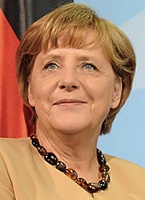Angela Merkel reelected German chancellor for third time
18 Dec 2013
 Angela Merkel has been ovewhelmingly elected as German chancellor for the third time, after she struck a deal with her centre-left rivals to end months of political uncertainty in Europe's largest economy.
Angela Merkel has been ovewhelmingly elected as German chancellor for the third time, after she struck a deal with her centre-left rivals to end months of political uncertainty in Europe's largest economy.
Though Merkel's conservatives secured a stunning third win in the 22 September elections, an outright majority proved elusive, forcing Merkel to cut a deal after lengthy coalition talks with the rival Social Democrats (SPD).
Having secured 504 of the 631 seats, 59-year-old Merkel's centre-right Christian Democrats Union (CDU) bloc and the SPD now enjoy a comfortable majority in the Bundestag, the lower house of parliament, under their hard-fought 'grand coalition' deal.
"I accept the election result and thank you for your trust," said Merkel after the confirmation vote in the Bundestag, as she received a bouquet of flowers and shook hands with other MPs.
The first woman chancellor of Germany was confirmed by 462 votes yesterday, with nine abstentions. The vote was held in the presence of 621 members of parliament, of whom 150 voted against Merkel.
She will become Germany's third post-war chancellor to win a third four-year term. Before Merkel, her mentor Helmut Kohl (1982-1998) and Konrad Adenauer (1949-1963) had won three four year terms.
Merkel's right-left government, which includes the rival Social Democrats (SPD), would face a number of challenges, not the least being, transitioning from nuclear to renewable energy.
Among the important tasks ahead for the 59 year old premier is a EU summit in Brussels at which leaders are under pressure to strike a deal on the bloc's ambitious "banking union" project.
In response to a question on a television interview, as to what her new term would mean for struggling euro states like Greece, Portugal and Spain, sticking to her tough stand said, "Those who know me know that I want improvements in competitiveness, I want solid finances and above all a situation where the euro is stable, in other words investors in the currency have confidence that they will get their money back one day," she told public station ARD. "Without growth this won't work. But growth can't mean simply more public spending."


















